Exam 18: A Roadmap for Analyzing Data
Exam 1: Defining and Collecting Data207 Questions
Exam 2: Organizing and Visualizing Variables213 Questions
Exam 3: Numerical Descriptive Measures167 Questions
Exam 4: Basic Probability171 Questions
Exam 5: Discrete Probability Distributions217 Questions
Exam 6: The Normal Distributions and Other Continuous Distributions189 Questions
Exam 7: Sampling Distributions135 Questions
Exam 8: Confidence Interval Estimation189 Questions
Exam 9: Fundamentals of Hypothesis Testing: One-Sample Tests187 Questions
Exam 10: Two-Sample Tests208 Questions
Exam 11: Analysis of Variance216 Questions
Exam 12: Chi-Square and Nonparametric Tests178 Questions
Exam 13: Simple Linear Regression214 Questions
Exam 14: Introduction to Multiple Regression336 Questions
Exam 15: Multiple Regression Model Building99 Questions
Exam 16: Time-Series Forecasting173 Questions
Exam 17: Business Analytics115 Questions
Exam 18: A Roadmap for Analyzing Data329 Questions
Exam 19: Statistical Applications in Quality Management Online162 Questions
Exam 20: Decision Making Online129 Questions
Exam 21: Understanding Statistics: Descriptive and Inferential Techniques39 Questions
Select questions type
SCENARIO 18-8 The superintendent of a school district wanted to predict the percentage of students passing a sixth-grade proficiency test.She obtained the data on percentage of students passing the proficiency test (% Passing), daily mean of the percentage of students attending class (% Attendance), mean teacher salary in dollars (Salaries), and instructional spending per pupil in dollars (Spending)of 47 schools in the state. Following is the multiple regression output with  as the dependent variable,
as the dependent variable, 
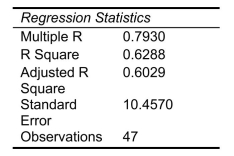
 -Referring to Scenario 18-8, what are the numerator and denominator degrees of freedom, respectively, for the test statistic to determine whether there is a significant relationship between percentage of students passing the proficiency test and the entire set of explanatory variables?
-Referring to Scenario 18-8, what are the numerator and denominator degrees of freedom, respectively, for the test statistic to determine whether there is a significant relationship between percentage of students passing the proficiency test and the entire set of explanatory variables?
(Short Answer)
4.8/5  (36)
(36)
SCENARIO 18-10 Given below are results from the regression analysis where the dependent variable is the number of weeks a worker is unemployed due to a layoff (Unemploy)and the independent variables are the age of the worker (Age), the number of years of education received (Edu), the number of years at the previous job (Job Yr), a dummy variable for marital status (Married: 1 = married, 0 = otherwise), a dummy variable for head of household (Head: 1 = yes, 0 = no)and a dummy variable for management position (Manager: 1 = yes, 0 = no).We shall call this Model 1.The coefficient of partial determination  of each of the 6 predictors are, respectively, 0.2807, 0.0386, 0.0317, 0.0141, 0.0958, and 0.1201.
of each of the 6 predictors are, respectively, 0.2807, 0.0386, 0.0317, 0.0141, 0.0958, and 0.1201. 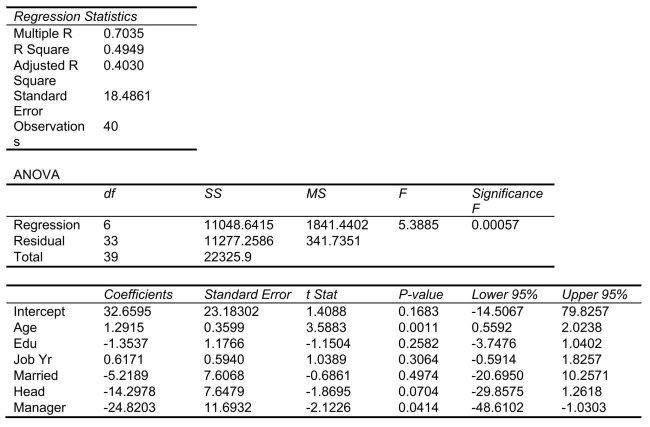 Model 2 is the regression analysis where the dependent variable is Unemploy and the independent variables are Age and Manager.The results of the regression analysis are given below:
Model 2 is the regression analysis where the dependent variable is Unemploy and the independent variables are Age and Manager.The results of the regression analysis are given below: 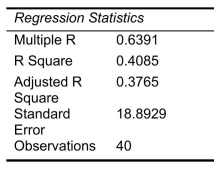
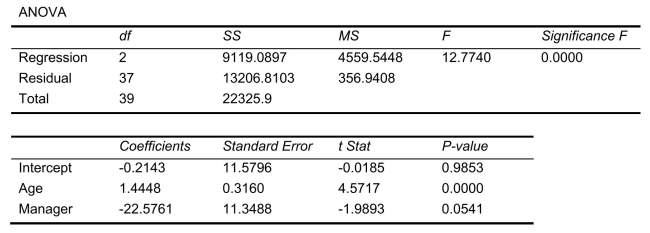 -Referring to Scenario 18-10 Model 1, we can conclude that, holding constant the effect of the other independent variables, there is a difference in the mean number of weeks a worker is unemployed due to a layoff between a worker who is married and one who is not at a 5% level of significance if we use only the information of the 95% confidence interval estimate for
-Referring to Scenario 18-10 Model 1, we can conclude that, holding constant the effect of the other independent variables, there is a difference in the mean number of weeks a worker is unemployed due to a layoff between a worker who is married and one who is not at a 5% level of significance if we use only the information of the 95% confidence interval estimate for  .
.
(True/False)
4.8/5  (34)
(34)
SCENARIO 18-5 You worked as an intern at We Always Win Car Insurance Company last summer.You notice that individual car insurance premiums depend very much on the age of the individual, the number of traffic tickets received by the individual, and the population density of the city in which the individual lives.You performed a regression analysis in EXCEL and obtained the following information: Regression Analysis 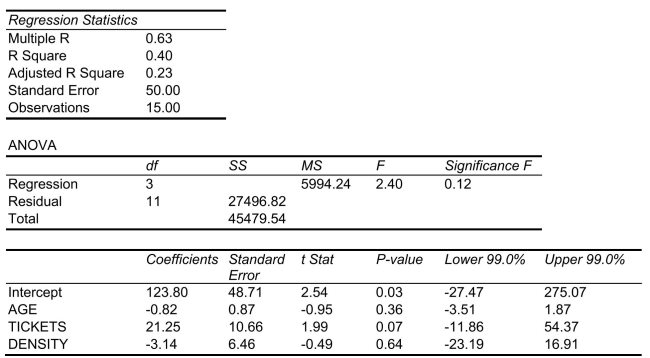 -Referring to Scenario 18-5, the total degrees of freedom that are missing in the ANOVA table should be ______.
-Referring to Scenario 18-5, the total degrees of freedom that are missing in the ANOVA table should be ______.
(Short Answer)
4.8/5  (39)
(39)
SCENARIO 18-9 What are the factors that determine the acceleration time (in sec.)from 0 to 60 miles per hour of a car? Data on the following variables for 171 different vehicle models were collected: Accel Time: Acceleration time in sec. Cargo Vol: Cargo volume in cu.ft. HP: Horsepower MPG: Miles per gallon SUV: 1 if the vehicle model is an SUV with Coupe as the base when SUV and Sedan are both 0 Sedan: 1 if the vehicle model is a sedan with Coupe as the base when SUV and Sedan are both 0 The regression results using acceleration time as the dependent variable and the remaining variables as the independent variables are presented below. SCENARIO 18-9 cont. 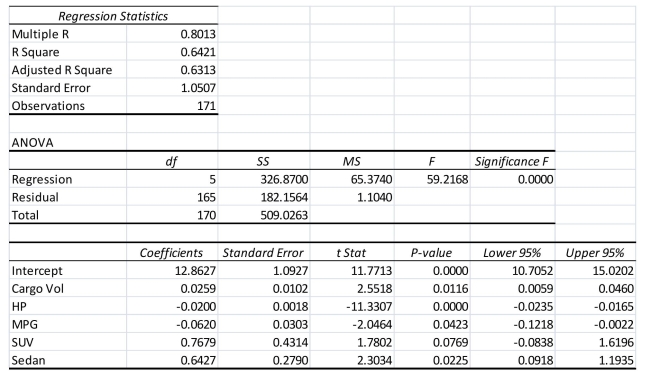 The various residual plots are as shown below.
The various residual plots are as shown below. 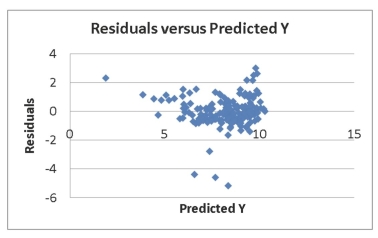 SCENARIO 18-9 cont.
SCENARIO 18-9 cont. 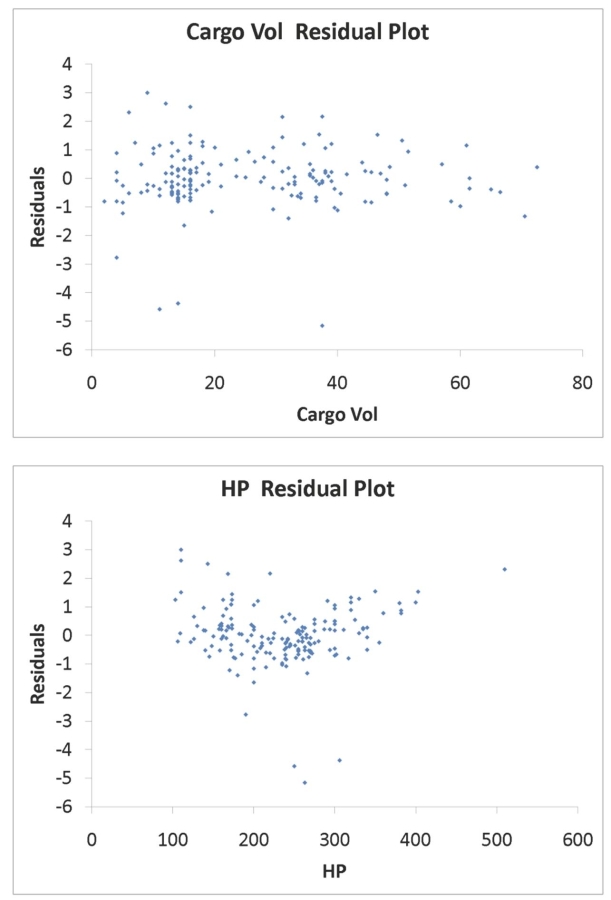 SCENARIO 18-9 cont.
SCENARIO 18-9 cont. 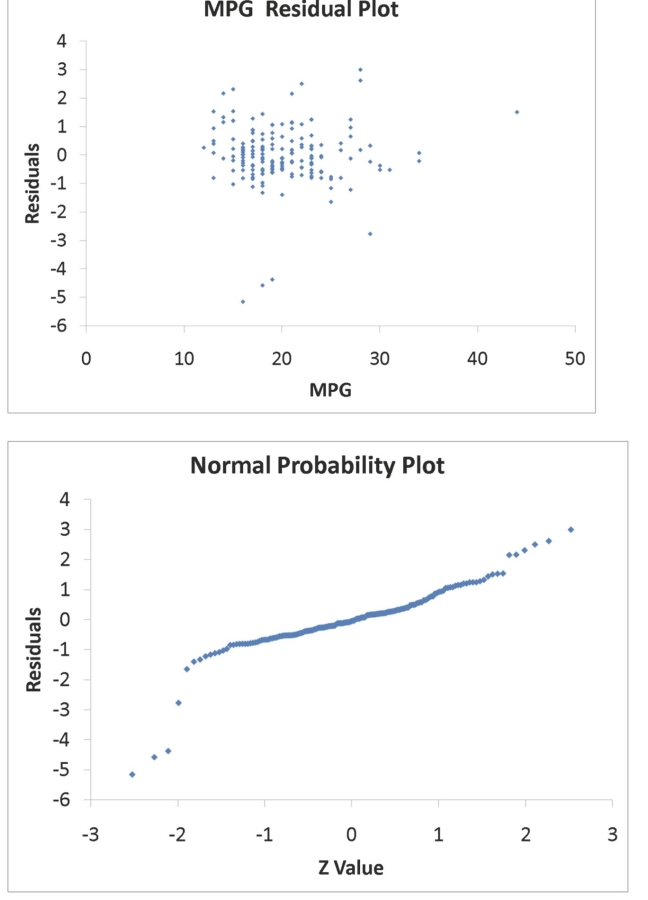 The coefficient of partial determination
The coefficient of partial determination  of each of the 5 predictors are, respectively, 0.0380, 0.4376, 0.0248, 0.0188, and 0.0312. The coefficient of multiple determination for the regression model using each of the 5 variables
of each of the 5 predictors are, respectively, 0.0380, 0.4376, 0.0248, 0.0188, and 0.0312. The coefficient of multiple determination for the regression model using each of the 5 variables  as the dependent variable and all other X variables as independent variables (
as the dependent variable and all other X variables as independent variables (  )are, respectively, 0.7461, 0.5676, 0.6764, 0.8582, 0.6632.
-Referring to Scenario 18-9, the error appears to be left-skewed.
)are, respectively, 0.7461, 0.5676, 0.6764, 0.8582, 0.6632.
-Referring to Scenario 18-9, the error appears to be left-skewed.
(True/False)
4.7/5  (31)
(31)
SCENARIO 18-8 The superintendent of a school district wanted to predict the percentage of students passing a sixth-grade proficiency test.She obtained the data on percentage of students passing the proficiency test (% Passing), daily mean of the percentage of students attending class (% Attendance), mean teacher salary in dollars (Salaries), and instructional spending per pupil in dollars (Spending)of 47 schools in the state. Following is the multiple regression output with  as the dependent variable,
as the dependent variable, 

 -Referring to Scenario 18-8, what is the p-value of the test statistic when testing whether instructional spending per pupil has any effect on percentage of students passing the proficiency test, considering the effect of all the other independent variables?
-Referring to Scenario 18-8, what is the p-value of the test statistic when testing whether instructional spending per pupil has any effect on percentage of students passing the proficiency test, considering the effect of all the other independent variables?
(Short Answer)
4.7/5  (42)
(42)
SCENARIO 18-10 Given below are results from the regression analysis where the dependent variable is the number of weeks a worker is unemployed due to a layoff (Unemploy)and the independent variables are the age of the worker (Age), the number of years of education received (Edu), the number of years at the previous job (Job Yr), a dummy variable for marital status (Married: 1 = married, 0 = otherwise), a dummy variable for head of household (Head: 1 = yes, 0 = no)and a dummy variable for management position (Manager: 1 = yes, 0 = no).We shall call this Model 1.The coefficient of partial determination  of each of the 6 predictors are, respectively, 0.2807, 0.0386, 0.0317, 0.0141, 0.0958, and 0.1201.
of each of the 6 predictors are, respectively, 0.2807, 0.0386, 0.0317, 0.0141, 0.0958, and 0.1201.  Model 2 is the regression analysis where the dependent variable is Unemploy and the independent variables are Age and Manager.The results of the regression analysis are given below:
Model 2 is the regression analysis where the dependent variable is Unemploy and the independent variables are Age and Manager.The results of the regression analysis are given below: 
 -Referring to Scenario 18-10 Model 1, ________ of the variation in the number of weeks a worker is unemployed due to a layoff can be explained by the age of the worker while controlling for the other independent variables.
-Referring to Scenario 18-10 Model 1, ________ of the variation in the number of weeks a worker is unemployed due to a layoff can be explained by the age of the worker while controlling for the other independent variables.
(Short Answer)
4.9/5  (37)
(37)
SCENARIO 18-10 Given below are results from the regression analysis where the dependent variable is the number of weeks a worker is unemployed due to a layoff (Unemploy)and the independent variables are the age of the worker (Age), the number of years of education received (Edu), the number of years at the previous job (Job Yr), a dummy variable for marital status (Married: 1 = married, 0 = otherwise), a dummy variable for head of household (Head: 1 = yes, 0 = no)and a dummy variable for management position (Manager: 1 = yes, 0 = no).We shall call this Model 1.The coefficient of partial determination  of each of the 6 predictors are, respectively, 0.2807, 0.0386, 0.0317, 0.0141, 0.0958, and 0.1201.
of each of the 6 predictors are, respectively, 0.2807, 0.0386, 0.0317, 0.0141, 0.0958, and 0.1201.  Model 2 is the regression analysis where the dependent variable is Unemploy and the independent variables are Age and Manager.The results of the regression analysis are given below:
Model 2 is the regression analysis where the dependent variable is Unemploy and the independent variables are Age and Manager.The results of the regression analysis are given below: 
 -Referring to Scenario 18-10 and using both Model 1 and Model 2, there is insufficient evidence to conclude that the independent variables that are not significant individually are significant as a group in explaining the variation in the dependent variable at a 5% level of significance?
-Referring to Scenario 18-10 and using both Model 1 and Model 2, there is insufficient evidence to conclude that the independent variables that are not significant individually are significant as a group in explaining the variation in the dependent variable at a 5% level of significance?
(True/False)
4.9/5  (34)
(34)
SCENARIO 18-9 What are the factors that determine the acceleration time (in sec.)from 0 to 60 miles per hour of a car? Data on the following variables for 171 different vehicle models were collected: Accel Time: Acceleration time in sec. Cargo Vol: Cargo volume in cu.ft. HP: Horsepower MPG: Miles per gallon SUV: 1 if the vehicle model is an SUV with Coupe as the base when SUV and Sedan are both 0 Sedan: 1 if the vehicle model is a sedan with Coupe as the base when SUV and Sedan are both 0 The regression results using acceleration time as the dependent variable and the remaining variables as the independent variables are presented below. SCENARIO 18-9 cont.  The various residual plots are as shown below.
The various residual plots are as shown below.  SCENARIO 18-9 cont.
SCENARIO 18-9 cont.  SCENARIO 18-9 cont.
SCENARIO 18-9 cont.  The coefficient of partial determination
The coefficient of partial determination  of each of the 5 predictors are, respectively, 0.0380, 0.4376, 0.0248, 0.0188, and 0.0312. The coefficient of multiple determination for the regression model using each of the 5 variables
of each of the 5 predictors are, respectively, 0.0380, 0.4376, 0.0248, 0.0188, and 0.0312. The coefficient of multiple determination for the regression model using each of the 5 variables  as the dependent variable and all other X variables as independent variables (
as the dependent variable and all other X variables as independent variables (  )are, respectively, 0.7461, 0.5676, 0.6764, 0.8582, 0.6632.
-Referring to Scenario 18-9, what is the value of the test statistic to determine whether Cargo Vol makes a significant contribution to the regression model in the presence of the other independent variables at a 5% level of significance?
)are, respectively, 0.7461, 0.5676, 0.6764, 0.8582, 0.6632.
-Referring to Scenario 18-9, what is the value of the test statistic to determine whether Cargo Vol makes a significant contribution to the regression model in the presence of the other independent variables at a 5% level of significance?
(Short Answer)
4.8/5  (42)
(42)
SCENARIO 18-9 What are the factors that determine the acceleration time (in sec.)from 0 to 60 miles per hour of a car? Data on the following variables for 171 different vehicle models were collected: Accel Time: Acceleration time in sec. Cargo Vol: Cargo volume in cu.ft. HP: Horsepower MPG: Miles per gallon SUV: 1 if the vehicle model is an SUV with Coupe as the base when SUV and Sedan are both 0 Sedan: 1 if the vehicle model is a sedan with Coupe as the base when SUV and Sedan are both 0 The regression results using acceleration time as the dependent variable and the remaining variables as the independent variables are presented below. SCENARIO 18-9 cont.  The various residual plots are as shown below.
The various residual plots are as shown below.  SCENARIO 18-9 cont.
SCENARIO 18-9 cont.  SCENARIO 18-9 cont.
SCENARIO 18-9 cont.  The coefficient of partial determination
The coefficient of partial determination  of each of the 5 predictors are, respectively, 0.0380, 0.4376, 0.0248, 0.0188, and 0.0312. The coefficient of multiple determination for the regression model using each of the 5 variables
of each of the 5 predictors are, respectively, 0.0380, 0.4376, 0.0248, 0.0188, and 0.0312. The coefficient of multiple determination for the regression model using each of the 5 variables  as the dependent variable and all other X variables as independent variables (
as the dependent variable and all other X variables as independent variables (  )are, respectively, 0.7461, 0.5676, 0.6764, 0.8582, 0.6632.
-Referring to Scenario 18-9, what is the value of the test statistic to determine whether MPG makes a significant contribution to the regression model in the presence of the other independent variables at a 5% level of significance?
)are, respectively, 0.7461, 0.5676, 0.6764, 0.8582, 0.6632.
-Referring to Scenario 18-9, what is the value of the test statistic to determine whether MPG makes a significant contribution to the regression model in the presence of the other independent variables at a 5% level of significance?
(Short Answer)
4.7/5  (36)
(36)
SCENARIO 18-11 A logistic regression model was estimated in order to predict the probability that a randomly chosen university or college would be a private university using information on mean total Scholastic Aptitude Test score (SAT)at the university or college, the room and board expense measured in thousands of dollars (Room/Brd), and whether the TOEFL criterion is at least 550 (Toefl550 = 1 if yes, 0 otherwise.)The dependent variable, Y, is school type (Type = 1 if private and 0 otherwise). The Minitab output is given below: 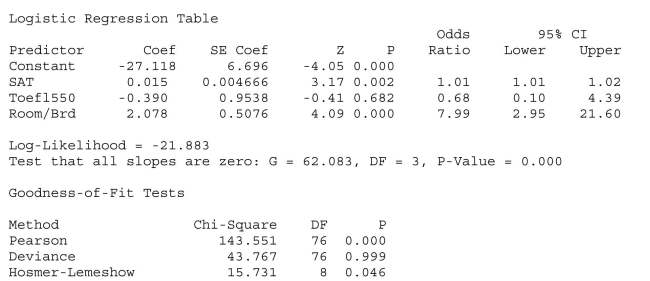 -Referring to Scenario 18-11, what are the degrees of freedom for the chi-square distribution when testing whether the model is a good-fitting model?
-Referring to Scenario 18-11, what are the degrees of freedom for the chi-square distribution when testing whether the model is a good-fitting model?
(Short Answer)
4.8/5  (29)
(29)
Four surgical procedures currently are used to install pacemakers.If the patient does not need to return for follow-up surgery, the operation is called a "clear" operation.A heart center wants to compare the 4 procedures, and collects the following numbers of patients from their own records:  Which of the following tests will be the most appropriate to find out whether the 4 procedures are equally effective?
Which of the following tests will be the most appropriate to find out whether the 4 procedures are equally effective?
(Multiple Choice)
4.8/5  (45)
(45)
The Tampa International Airport (TIA)has been criticized for the waiting times associated with departing flights.While the critics acknowledge that many flights have little or no waiting times, their complaints deal more specifically with the longer waits attributed to some flights.The critics are interested in showing, mathematically, exactly what the problems are.Which type of distribution would best model the waiting times of the departing flights at TIA?
(Multiple Choice)
4.8/5  (38)
(38)
From an inventory of 48 new cars being shipped to local dealerships, corporate reports indicate that 12 have defective radios installed.Which of the following distributions would you use to determine the probability that out of the 8 new cars it just received that, when each is tested, no more than 2 of the cars have defective radios?
(Multiple Choice)
4.9/5  (31)
(31)
SCENARIO 18-8 The superintendent of a school district wanted to predict the percentage of students passing a sixth-grade proficiency test.She obtained the data on percentage of students passing the proficiency test (% Passing), daily mean of the percentage of students attending class (% Attendance), mean teacher salary in dollars (Salaries), and instructional spending per pupil in dollars (Spending)of 47 schools in the state. Following is the multiple regression output with  as the dependent variable,
as the dependent variable, 

 -Referring to Scenario 18-8, the null hypothesis should be rejected at a 5% level of significance when testing whether instructional spending per pupil has any effect on percentage of students passing the proficiency test, considering the effect of all the other independent variables.
-Referring to Scenario 18-8, the null hypothesis should be rejected at a 5% level of significance when testing whether instructional spending per pupil has any effect on percentage of students passing the proficiency test, considering the effect of all the other independent variables.
(True/False)
4.8/5  (30)
(30)
Every spring semester, the School of Business coordinates a luncheon for graduating seniors, their families, and friends with local business leaders .Corporate sponsorship pays for the lunches of each of the seniors, but students have to purchase tickets to cover the cost of lunches served to guests they bring with them.Data on the number of guests each graduating senior invited to the luncheon and the number of graduating seniors in each category were collected.A histogram can be used to present this information.
(True/False)
4.7/5  (38)
(38)
The use of preservatives by food processors has become a controversial issue.Suppose 2 preservatives are extensively tested and determined safe for use in meats.A processor wants to compare the preservatives for their effects on retarding spoilage.They will choose to use the preservative that can keep the meat fresh for the longest amount of time. Suppose 15 cuts of fresh meat are treated with preservative I and 15 are treated with preservative II, and the number of hours until spoilage begins is recorded for each of the 30 cuts of meat.Suppose the variability of the number of hours until spoilage is the same for meat treated by both preservatives, but the normal probability plots reveal that the number of hours until spoilage is right-skewed for the 15 cuts treated by preservative I and left- skewed for the 15 cuts treated with preservative II.Which of the following tests will be the most appropriate?
(Multiple Choice)
4.9/5  (42)
(42)
SCENARIO 18-9 What are the factors that determine the acceleration time (in sec.)from 0 to 60 miles per hour of a car? Data on the following variables for 171 different vehicle models were collected: Accel Time: Acceleration time in sec. Cargo Vol: Cargo volume in cu.ft. HP: Horsepower MPG: Miles per gallon SUV: 1 if the vehicle model is an SUV with Coupe as the base when SUV and Sedan are both 0 Sedan: 1 if the vehicle model is a sedan with Coupe as the base when SUV and Sedan are both 0 The regression results using acceleration time as the dependent variable and the remaining variables as the independent variables are presented below. SCENARIO 18-9 cont.  The various residual plots are as shown below.
The various residual plots are as shown below.  SCENARIO 18-9 cont.
SCENARIO 18-9 cont.  SCENARIO 18-9 cont.
SCENARIO 18-9 cont.  The coefficient of partial determination
The coefficient of partial determination  of each of the 5 predictors are, respectively, 0.0380, 0.4376, 0.0248, 0.0188, and 0.0312. The coefficient of multiple determination for the regression model using each of the 5 variables
of each of the 5 predictors are, respectively, 0.0380, 0.4376, 0.0248, 0.0188, and 0.0312. The coefficient of multiple determination for the regression model using each of the 5 variables  as the dependent variable and all other X variables as independent variables (
as the dependent variable and all other X variables as independent variables (  )are, respectively, 0.7461, 0.5676, 0.6764, 0.8582, 0.6632.
-Referring to Scenario 18-9, which of the following assumptions is most likely violated based on the normal probability plot?
)are, respectively, 0.7461, 0.5676, 0.6764, 0.8582, 0.6632.
-Referring to Scenario 18-9, which of the following assumptions is most likely violated based on the normal probability plot?
(Multiple Choice)
4.8/5  (28)
(28)
SCENARIO 18-1 A real estate builder wishes to determine how house size (House)is influenced by family income (Income), family size (Size), and education of the head of household (School).House size is measured in hundreds of square feet, income is measured in thousands of dollars, and education is in years.The builder randomly selected 50 families and ran the multiple regression.Microsoft Excel output is provided below: SUMMARY OUTPUT 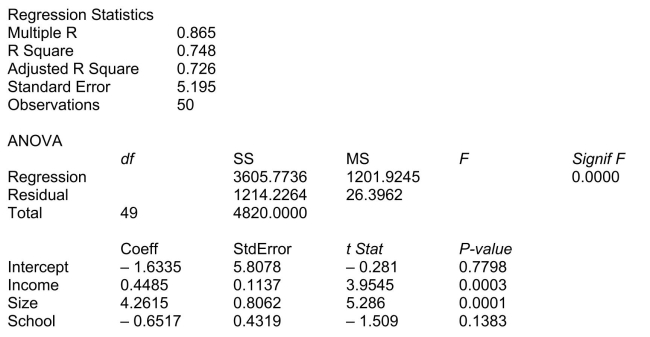 -Referring to Scenario 18-1, at the 0.01 level of significance, what conclusion should the builder reach regarding the inclusion of Income in the regression model?
-Referring to Scenario 18-1, at the 0.01 level of significance, what conclusion should the builder reach regarding the inclusion of Income in the regression model?
(Multiple Choice)
4.9/5  (33)
(33)
SCENARIO 18-10 Given below are results from the regression analysis where the dependent variable is the number of weeks a worker is unemployed due to a layoff (Unemploy)and the independent variables are the age of the worker (Age), the number of years of education received (Edu), the number of years at the previous job (Job Yr), a dummy variable for marital status (Married: 1 = married, 0 = otherwise), a dummy variable for head of household (Head: 1 = yes, 0 = no)and a dummy variable for management position (Manager: 1 = yes, 0 = no).We shall call this Model 1.The coefficient of partial determination  of each of the 6 predictors are, respectively, 0.2807, 0.0386, 0.0317, 0.0141, 0.0958, and 0.1201.
of each of the 6 predictors are, respectively, 0.2807, 0.0386, 0.0317, 0.0141, 0.0958, and 0.1201.  Model 2 is the regression analysis where the dependent variable is Unemploy and the independent variables are Age and Manager.The results of the regression analysis are given below:
Model 2 is the regression analysis where the dependent variable is Unemploy and the independent variables are Age and Manager.The results of the regression analysis are given below: 
 -Referring to Scenario 18-10 and using both Model 1 and Model 2, what is the value of the test statistic for testing whether the independent variables that are not significant individually are also not significant as a group in explaining the variation in the dependent variable at a 5% level of significance?
-Referring to Scenario 18-10 and using both Model 1 and Model 2, what is the value of the test statistic for testing whether the independent variables that are not significant individually are also not significant as a group in explaining the variation in the dependent variable at a 5% level of significance?
(Short Answer)
4.9/5  (41)
(41)
SCENARIO 18-8 The superintendent of a school district wanted to predict the percentage of students passing a sixth-grade proficiency test.She obtained the data on percentage of students passing the proficiency test (% Passing), daily mean of the percentage of students attending class (% Attendance), mean teacher salary in dollars (Salaries), and instructional spending per pupil in dollars (Spending)of 47 schools in the state. Following is the multiple regression output with  as the dependent variable,
as the dependent variable, 

 -Referring to Scenario 18-8, what is the p-value of the test statistic when testing whether daily average of the percentage of students attending class has any effect on percentage of students passing the proficiency test, considering the effect of all the other independent variables?
-Referring to Scenario 18-8, what is the p-value of the test statistic when testing whether daily average of the percentage of students attending class has any effect on percentage of students passing the proficiency test, considering the effect of all the other independent variables?
(Short Answer)
4.7/5  (36)
(36)
Showing 61 - 80 of 329
Filters
- Essay(0)
- Multiple Choice(0)
- Short Answer(0)
- True False(0)
- Matching(0)